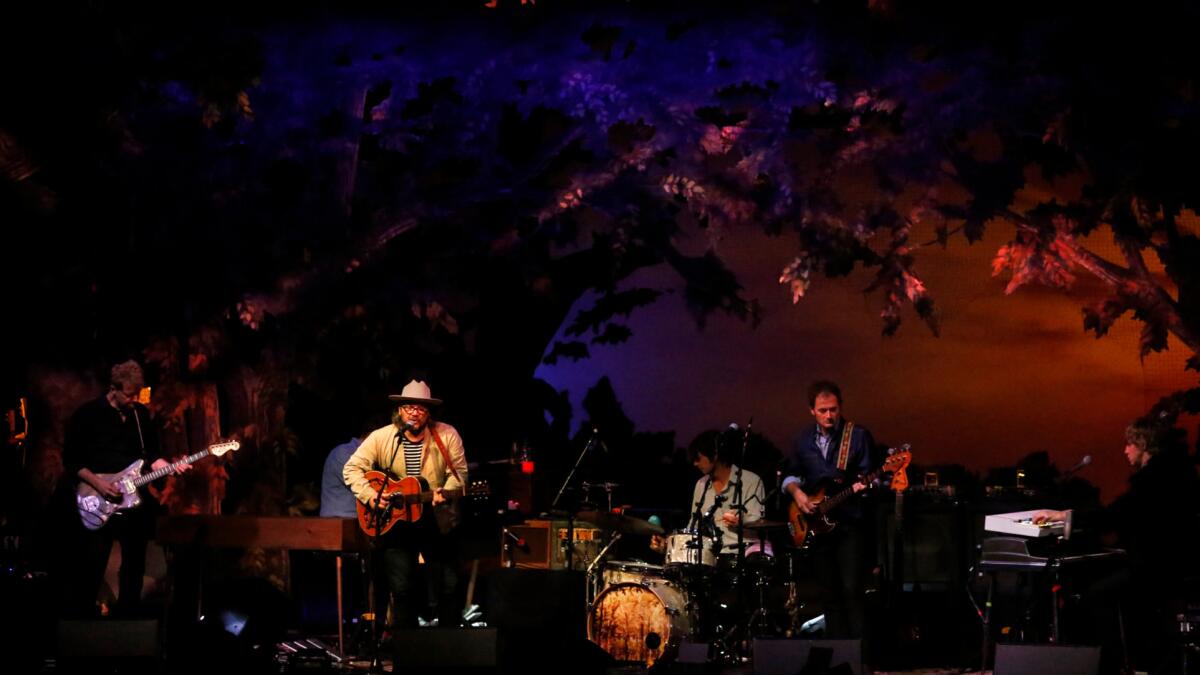‘It’s pretty fun to hate people’: What Jeff Tweedy says about making Wilco’s most unsettling album

The stage looked set for a theatrical play instead of a rock concert. Cut-outs of trees framed the scene, and tricks of the light switched the mood from swampy to autumnal at a verse’s notice. It was all rather calming.
But don’t be fooled.
For the record:
1:15 p.m. Jan. 9, 2025An earlier version of this article referred to Wilco’s song “Normal American Kids” as “North American Kids.”
Wilco, more than two decades into its career and in Los Angeles for three sold-out nights at downtown’s Theatre at the Ace Hotel, has just released what might be its most unsettling work.
No two Wilco albums are alike, and “Schmilco,” the band’s 10th proper studio effort, is a folksy record. But it’s an odd one, where space between instruments is emphasized and melodies are often unexpectedly spliced or dotted with peculiar details. Songs come with a whiff of nostalgia, and more than a hint of scorn. “Schmilco,” the band’s quietest album, is a work built for a time of tension.

Yet it’s less about anger, and more about embracing it. Though its lyrics are some of the band’s most personal, it also feels timely — reflective of an age when distrust is often a default. “Happiness depends on who you blame,” Jeff Tweedy sings at one point on the album.
“It’s about enjoying and allowing myself to be negative,” said band leader Tweedy before the sextet arrived in L.A.
“There’s a certain amount of joy and celebration in darker energies, in bitterness and anger,” he continued. “You know people like that. Maybe I’m one of those people. Maybe I’m coming out as a person who actually has a good time being pretty misanthropic. It’s pretty fun to hate people, I have to be honest, and there’s a lot of things about humans that are definitely deserving of scorn.”
On Tuesday night, new songs veered from the prickly to the paranoid. See the pin-pricked guitars and quiet bitterness of “Nope,” the sudden, jolting build of “Locator,” and the spare, whispering notes of the fearful and angry “Normal American Kids.” On the latter, the tone is wistful, but the message is weary — a lived-in skepticism of the burden of normalcy.
“I can definitely hear that,” Tweedy said when told that “Schmilco” felt rather cynical for a Wilco record. The band, after all, is just one year removed from the abstract yet highly melodic noise freak-outs of “Star Wars,” its ninth album, and just five years removed from brightly dense pop orchestrations of “The Whole Love.”
“I would stop short of calling this cynical, though,” he said, “for a couple reasons. It doesn’t feel hopeless to me. I think it actually belies a lot of hope. It’s a frustration of knowing that we can do better, knowing that I can do better. I hear it more as that, rather than, ‘There’s no way we’ll ever do better.’ That may just be me spinning it right now, as I certainly wasn’t shy about being negative.”
As the concert Tuesday veered into its homestretch, Tweedy sang, “As a favor, can you be entertained?” But it wasn’t necessarily polite, especially if one focused on guitarist Nels Cline striking his instrument with a violinist’s bow. On “Schmilco,” and in a set designed to showcase the new works, Wilco manages to find quite a bit of havoc in songs that are primarily acoustic-based.
See the most-read stories in Entertainment this hour >> »
The album, once again released independently on the band’s own dBpm Records after years within the Warner Bros. system, is a sort of bookend to last year’s louder, more sonically aggressive “Star Wars,” a record that, Tweedy joked from the stage Tuesday night, was ultimately meant to be called “Cease & Desist.” Lucasfilm, however, didn’t bite.
Both works are rough, raw and feel rather improvised. They each represent a relatively drastic shift in feel from Wilco’s earlier works — the studio-driven deconstructions of its breakout “Yankee Hotel Foxtrot” or the exquisite country-soul of “Sky Blue Sky.”
Wilco once seemed as if it were after perfection, letting songs be driven by the understated yet tuneful bass of John Stirratt, or the wild, skillfully reckless rhythms of drummer Glenn Kotche. On “The Whole Love,” the production chops of multi-instrumentalist Pat Sansone shined, as rock songs occasionally took on a symphonic quality.
Tweedy admits that Wilco could once spend days perfecting a singular rhythm, a type of record-making that celebrated the album as a grand statement. That era of the band is over — at least for now. “Star Wars” and “Schmilco” carry more of an air of spontaneity rather than studio elegance.
“At this point in my life I would personally have a tough time going the route of ‘A Moon Shaped Pool,’” said Tweedy, 49, referring to Radiohead’s most recent album, a meticulously crafted work where every note feels in its right place.
“That’s not a criticism,” he emphasized. “It’s a spectacular piece of work, and I understand the desire to be grand and put that into the world. I just don’t have the disposition right now for that kind of statement.”
And yet “Schmilco” does have a few proclamations on its mind. There are character sketches — see “Quarters,” in which a barfly finds salvation in a jukebox — and also relatively positive statements about finding kinship in another human being. “We Aren’t the World (Safety Girl)” is the closest the collection has to a pop nugget, reveling in disconnecting from the cultural noise to obsess over another.
And then there’s “Someone to Lose,” a love song that feels like a kiss-off. The twilight-hued song tumbles along with a bouncy bass, only to be broken up by an electric guitar on high-alert. It’s not about infatuation or loneliness, but the act of simply learning how to be vulnerable.
“One of the reasons I think people stop [caring] as much as they get older is because they realize how little everything matters beyond the deep connection you have with loved ones,” Tweedy said of the song. “It’s a pretty important part of being human, to learn how to care about other people as much as yourself — more than yourself, even. The downside of that is you fear losing them, you fear that being taken away. That tension is what makes being alive worthwhile.”
“Schmilco,” then, even has a little hopeless romanticism beneath the cynicism.
“There’s definitely a concerted effort to not be completely dark, to work toward some sort of light and some sort of acceptance on all Wilco records,” Tweedy said. “That’s actually a guiding principle in sequencing records for me. I’ve always tried to work toward some deliverance of sort.
“But the fact that they are records, and are not hateful scrawls on the Internet or sniper bullets or something — the fact that these are records is hopeful,” he continued. “The act of creation has won.”
More to Read
The biggest entertainment stories
Get our big stories about Hollywood, film, television, music, arts, culture and more right in your inbox as soon as they publish.
You may occasionally receive promotional content from the Los Angeles Times.











